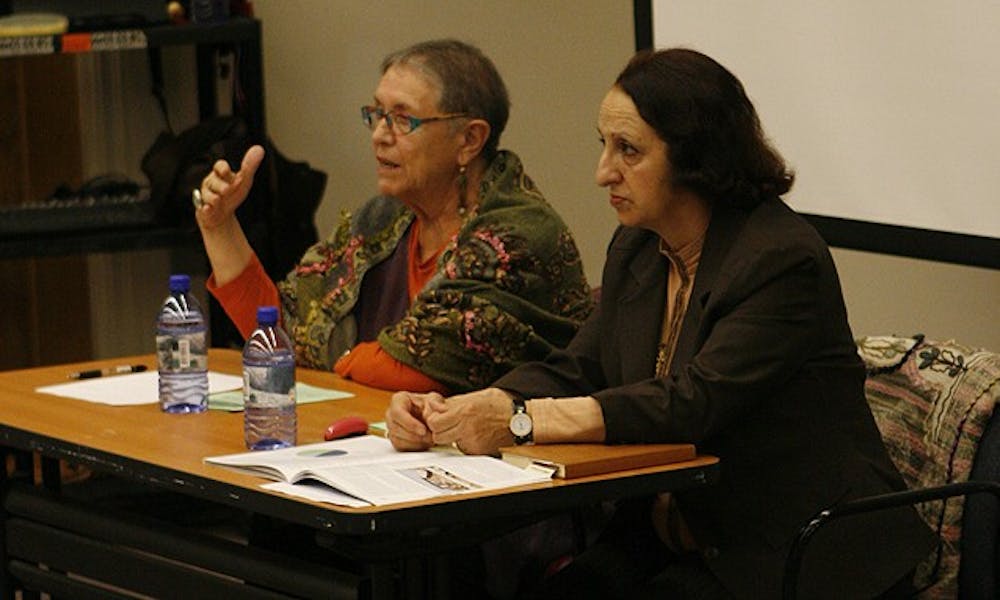A panel featuring two women from the Middle East became the site of a contentious dialogue over the Israeli-Palestinian conflict Tuesday night.
“Jerusalem Women Speak: Three Women, Three Faiths, One shared Vision,” is a speaking tour sponsored by Partners for Peace, a nonprofit group based in Washington, D.C. committed to raising public awareness about the Israeli-Palestinian conflict. The campus event, which was attended by approximately 30 people, was co-sponsored by the Duke Islamic Studies Center, Duke Human Rights Coalition, Center for Jewish Studies and the Duke University Center for International Studies.
Lauren Braun, the coordinator for the event, said in the past, discussions concerning the conflict in the Middle East have sparked debate within the Duke community.
“Getting the event to Duke was slightly controversial,” said Braun, who works as a staff specialist at the Duke Islamic Studies Center. “But we wanted to raise awareness of the Israeli-Palestinian conflict and show how these women have been through so much.”
The panel featured Jala Basil Andoni, a Christian Palestinian who lives east of Bethlehem, and Ruth El-Raz, an Israeli Jew who lives in Jerusalem. The third scheduled speaker, Hekmat Besisso-Naji, a Muslim Palestinian woman from Gaza, was unable to be a part of the panel because her visa was denied by the U.S. Department of State. Although the organizers hoped to connect to Besisso-Naji through the online communication program Skype, technical difficulties prevented their efforts.
Andoni, who is an English teacher in the Bethlehem district, focused her remarks on how Palestinians were affected by the Israeli occupation in East Jerusalem.
“It is not easy to live in an area surrounded by a wall that is 790 km long and winds its way like a snake around Palestinian territory,” Andoni said, adding that Palestinians who build homes without a license from the Israeli government face having their homes demolished.
Andoni described the restrictions Israeli policies were placing on Palestinian life, including the establishment of checkpoints where Palestinians were required to show a permit to travel between certain places in the West Bank and East Jerusalem. Andoni said there are more than 440 checkpoints in the West Bank, and Palestinians must stand in long queues to get their permits checked.
“This kind of procedure made several of us lose our jobs, including me,” she said. “As an English supervisor in the school district, I found transportation to my job difficult and I was forced to retire.”
El-Raz, who works as a therapist in Jerusalem, called for the end of the Israeli occupation of East Jerusalem in the West Bank.
“I am here because I want to say that the occupation is no solution to the Arab-Israeli conflict,” she said.
El-Raz spoke of an organization she created called Checkpoint Watch, which monitors human rights violations by Israeli soldiers at checkpoints and another organization that rebuilds Palestinian homes that are demolished in East Jerusalem. El-Raz said she believes that racism is prevalent in the Israel-Palestine region, while acknowledging that the majority of Israelis near the Gaza border are not aware of it.
“There has been a slow and steady increase of violence in Gaza,” El-Raz said. “There is a belief among too many people that keeping our country safe justifies the use of violence on Palestinian settlements.”
Although the panel was well-received by the audience of Duke students and Durham area residents, a heated debate arose during the question-and-answer session over the legitimacy of the Israeli occupation in the West Bank and the attacks by Hamas, a Palestinian paramilitary force.
“We are both sides of the divide. I am part of the Israeli side that you don’t normally hear,” El-Raz said in response to a comment pointing out that the panel did not evenly represent the views of both Israelis and Palestinians.
Still, some members of the audience felt that the panel was both informative and insightful.
“I felt like it was very useful to get a human perspective on these issues,” said Anne-Marie Angelo, a history graduate student. “One of the things that makes this issue difficult is misinformation.”
Get The Chronicle straight to your inbox
Signup for our weekly newsletter. Cancel at any time.

